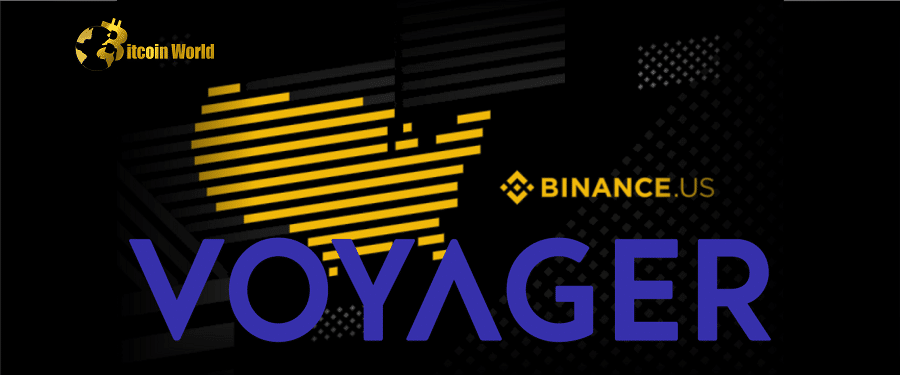The rollercoaster ride for crypto lender Voyager Digital might be inching towards a resolution. After filing for bankruptcy, Voyager has secured preliminary court approval to sell its assets to Binance.US for a cool $1.02 billion. Sounds like good news, right? Well, hold your horses. This deal still needs to clear a few significant hurdles, including the watchful eye of national security regulators.
What’s the Latest on the Voyager-Binance.US Deal?
Imagine finally seeing the finish line, only to realize there’s an extra lap. That’s kind of where Voyager is right now. A bankruptcy judge has given the green light for the asset purchase agreement, allowing Voyager to seek approval from its creditors. This happened on January 10th, according to a Reuters report. However, this is just the preliminary nod. The sale won’t be official until a future court hearing seals the deal.
The National Security Question Mark: Why is CFIUS Involved?
Here’s where things get a bit more complex. The Committee on Foreign Investment in the United States (CFIUS) has entered the chat. This inter-agency body is essentially the gatekeeper when it comes to foreign investments in US companies, especially if national security is a concern. Think of them as the financial bouncers, ensuring no unwanted elements get in.
Why is CFIUS Scrutinizing This Deal?
- Foreign Involvement: Binance’s global entity is under scrutiny, and its CEO, Changpeng “CZ” Zhao, is a Chinese-born Canadian citizen. CFIUS has the authority to review transactions that could give foreign entities control or an equity stake in a US business.
- Money Laundering Allegations: The US Attorney’s Office is reportedly investigating Binance’s global operations for potential money laundering. While Binance.US claims to be an independent entity, the connection raises red flags for CFIUS.
- Protecting National Interests: CFIUS’s primary goal is to safeguard US national security. They need to assess if this transaction could pose any risks in that regard.
Voyager’s Strategy: Speeding Up the Review
Voyager is understandably keen to get this deal finalized. Their legal team is actively engaging with CFIUS to address any concerns. During the court hearing, Voyager’s attorney, Joshua Sussberg, mentioned they are responding to CFIUS’s questions and are even voluntarily submitting an application to expedite the review process. Essentially, they’re saying, “We’re an open book, show us what you need!”
What Happens if CFIUS Objects?
If CFIUS decides there are legitimate national security concerns, they have several options:
- Block the Transaction: They can outright prevent the sale from happening.
- Unwind the Transaction: If the deal goes through before CFIUS review is complete and concerns arise, they can force the parties to reverse the transaction.
- Modify the Deal: They can instruct Voyager and Binance.US to make changes to the agreement to mitigate the identified security risks.
CFIUS signaled its potential involvement back in December, filing a court notice indicating that the Voyager deal could be subject to their review, potentially leading to delays or even a block.
The Creditors’ Perspective: A Bird in the Hand…
Interestingly, the Voyager Official Committee of Unsecured Creditors is backing the deal in its current form. Why? Because they believe it offers a better chance of recovering more of their funds compared to Voyager simply liquidating its assets. If CFIUS blocks the sale, liquidation becomes a more likely scenario, which would likely result in lower returns for creditors.
Remember the FTX Deal?
This isn’t Voyager’s first attempt at a sale. They previously had a $1.4 billion deal with FTX.US, which unfortunately crumbled when FTX itself went bankrupt. Following that setback, Voyager announced the agreement with Binance.US in December.
Key Takeaways: What Does This Mean for the Crypto World?
- Regulatory Scrutiny is Real: This situation highlights the increasing regulatory attention on the cryptocurrency industry, particularly concerning foreign involvement and national security.
- Impact on M&A Activity: The CFIUS review could set a precedent for future mergers and acquisitions in the crypto space, especially involving companies with international ties.
- Creditor Interests are Paramount: Despite the regulatory hurdles, the creditors’ support for the Binance.US deal underscores their desire for a swift and relatively favorable resolution.
What’s Next?
The coming weeks and months will be crucial. Voyager needs to successfully navigate the CFIUS review while also securing final court approval. The outcome of this deal will not only impact Voyager’s creditors but also provide valuable insights into the evolving regulatory landscape of the cryptocurrency industry.
In Conclusion: A Waiting Game
The Voyager Digital saga continues, with the Binance.US acquisition offering a potential lifeline. However, the involvement of CFIUS introduces a significant layer of uncertainty. Whether this deal sails through or hits a national security roadblock remains to be seen. For now, it’s a waiting game with high stakes for all involved.
Disclaimer: The information provided is not trading advice, Bitcoinworld.co.in holds no liability for any investments made based on the information provided on this page. We strongly recommend independent research and/or consultation with a qualified professional before making any investment decisions.




